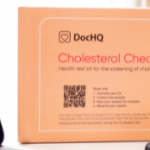The journey of womanhood is marked by various stages, and two significant milestones are the menstrual cycle and menopause. These natural processes can bring about significant changes in a woman’s life, both physically and emotionally. In this blog post, we will delve into the menstrual cycle, the signs that menopause may be approaching, and how DocHQ’s menopause health checks can provide valuable insights into this transformative phase of life.
Understanding the menstrual cycle
The menstrual cycle is a fundamental part of a woman’s reproductive system. It typically lasts about 28 days, although variations are common. Here’s a brief overview of the menstrual cycle’s key phases:
- Menstruation: The cycle begins with menstruation, which involves the shedding of the uterine lining. This phase typically lasts 3-7 days and is characterised by bleeding.
- Follicular Phase: Following menstruation, the body enters the follicular phase. During this time, the pituitary gland releases hormones that stimulate the ovaries to produce eggs. This phase can last from 7-21 days.
- Ovulation: Around the midpoint of the menstrual cycle, a surge in hormones triggers the release of a mature egg from the ovary. This is when conception is most likely to occur.
- Luteal Phase: After ovulation, the body enters the luteal phase, which prepares the uterine lining for possible pregnancy. If fertilisation does not occur, hormone levels drop, and the cycle begins anew.
Signs Menopause may be approaching
Menopause marks the end of a woman’s reproductive years, typically occurring between the ages of 45 and 55. However, the onset and experience of menopause can vary widely among individuals. There are over forty symptoms that show that menopause may be approaching, here are some of the most common signs:
- Irregular Periods: One of the first signs of perimenopause (the transitional phase leading to menopause) is irregular menstrual cycles. Periods may become shorter, longer, heavier, or lighter.
- Hot Flashes and Night Sweats: Hormonal fluctuations can lead to hot flashes and night sweats, causing discomfort and sleep disturbances.
- Vaginal Dryness: Decreased oestrogen levels can result in vaginal dryness and discomfort during intercourse.
- Mood Swings: Hormonal changes can also affect mood, leading to increased irritability, anxiety, or depression.
- Changes in Libido: Some women may experience a decrease in sexual desire as oestrogen levels decline.
How DocHQ’s Menopause Health Checks can help
DocHQ offers a valuable and accessible way for women to understand their menopause status. We carry two menopause health checks; the Menopause Check is our basic analysis which screens your follicle-stimulating hormone (FSH), and the MenoBalance Check is our comprehensive analysis which screens your FSH, Luteinising hormone, Oestradiol, Testosterone and more. Here’s how DocHQ can assist:
- Hormone Testing: DocHQ’s menopause health checks include hormone testing to measure oestrogen, progesterone, and follicle-stimulating hormone (FSH) levels. Elevated FSH levels can be a sign of menopause.
- Personalised Guidance: Based on the test results, DocHQ can offer personalised guidance on managing symptoms and optimising overall health during menopause.
- Accessible Testing: DocHQ’s range of at-home health checks, including our menopause checks, provide secure and accurate access to testing. Meaning you won’t have to go through the time consuming process of attending doctor’s appointments.
- Lifestyle Recommendations: DocHQ can offer advice on lifestyle changes, nutrition, and exercise to help women navigate the challenges of menopause more comfortably.
Conclusion
The menstrual cycle and menopause are transformative phases in a woman’s life. Understanding the signs of menopause and seeking support when needed is crucial. DocHQ’s menopause health checks offer a reliable way to assess hormonal changes and receive personalised guidance during this significant transition. Embracing this stage with knowledge and support can empower women to lead healthy and fulfilling lives beyond menopause.



